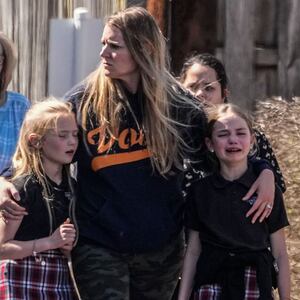When the CMT Music Awards announced that country star Kelsea Ballerini would be hosting this year’s ceremony, no one had a reason to believe that viewers would be in for anything that wasn’t par for the course. Ballerini has hosted the show for the past two years. She’s a staple in the modern country music scene, and in a genre that has largely been a bastion from polarizing social commentary, she’s become a relatively safe choice for these kinds of gigs.
But after Sunday night’s ceremony, Ballerini is decidedly off the “safe list.” In a one, two punch, Ballerini called for gun reform in front of country music’s biggest stars and then later performed alongside drag queens amid a slew of anti-drag legislation sweeping across the country. It’s the kind of move that leaves some country fans livid, declaring Ballerini as some kind of “woke” traitor of the genre. Truth is? Last night was the most country Kelsea Ballerini has ever been.
Opening the CMT Music Awards last night, Ballerini began with a sobering acknowledgement of the deaths of three nine year olds and three adults following last week’s mass shooting at a Christian school in Nashville. While it’s not the first time that an awards show addressed gun violence that hits close to home (CMA Awards host Brad Paisley was particularly vocal following the 2017 mass shooting at a Las Vegas music festival), Ballerini’s tearful plea for reform came from a deeply personal place. Holding back tears, she reflected on her own memory of a 2008 school shooter who killed a student at her high school in Knoxville, Tennessee—just three hours away from Nashville.
The response online was a split that anyone familiar with modern day country music would expect. Some viewers hailed Ballerini as a much needed voice in country music, while others cried that CMT was going “woke” with their political messaging. And yet, Ballerini was just getting started. Later in the night, the host gave a technicolor performance of “If You Go Down (I’m Going Down Too)” featuring four RuPaul’s Drag Race alumni. As the performance ended, the screen behind her lit up with a giant pride flag.
If you’re hearing the echo of a large explosion in the distance, it’s likely just the reverb from Kelsea Ballerini dropping all those bombs—in Austin, Texas—on the Lord’s day, no less. There’s at least a dozen places to start when it comes to unpacking the gravity of Ballerini’s hosting duties last night. There’s the fact that the ceremony was hosted out of Texas, which happens to be entertaining an anti-drag bill that could make a performance like Ballerini’s punishable with a $10,000 fine. There’s also the heartbreaking detail that school shootings have become so prevalent that the host of the CMT Music Awards has survived one, herself.
But the wildest detail out of all this is that 25 years ago, Ballerini’s brazenness would likely not have been as big of a deal as it is today. Since around the time that The Chicks’ Natalie Maines spoke out against then-President George W. Bush, country music has been inching its way toward a certain type of caricatured morality. Saturday nights are for trucks and beer. Sundays are for family and God, and anything that speaks to topics spicier than that has been met with an eyebrow raise.
But in the years leading up to that shift, country music had always been a genre where artists—women, specifically—challenged the hell out of the status quo. Dolly Parton and Loretta Lynn, at their mightiest, penned songs about where women fit in society. The ‘90s alone saw a political revolution in country music. Before the genre pivoted to campy, revenge-style songs, it was Martina McBride who was singing about domestic abuse. Reba McEntire was a radical for tackling a song about AIDS at a time when a song like “She Thinks His Name Was John” could have ended anyone’s career. Fans who believe that the past is some kind of “purer” time are revising country music history.
Ballerini going on stage and trotting out drag queens for a performance—one that could likely become illegal in the coming months—is bold and brave and country as it comes. Watching her open up the show by being strong enough to draw on her own experience with a school shooting is country, too, because it draws on the reality of her experience. Populist country music may lean more toward something like pontoon rock and throwing back cheap tequila, but what Ballerini did was more in line with the genre’s spirit than she might even realize.
For Hank Williams, the struggle was his alcoholism. For Merle Haggard, it was living paycheck to paycheck. And as it turns out, when Ballerini leans into the obstacles in our current moment, it’s mass shootings and drag queens. Today’s fan base may not appreciate that, but you’d better believe that time will look back on Ballerini as the voice we needed.







